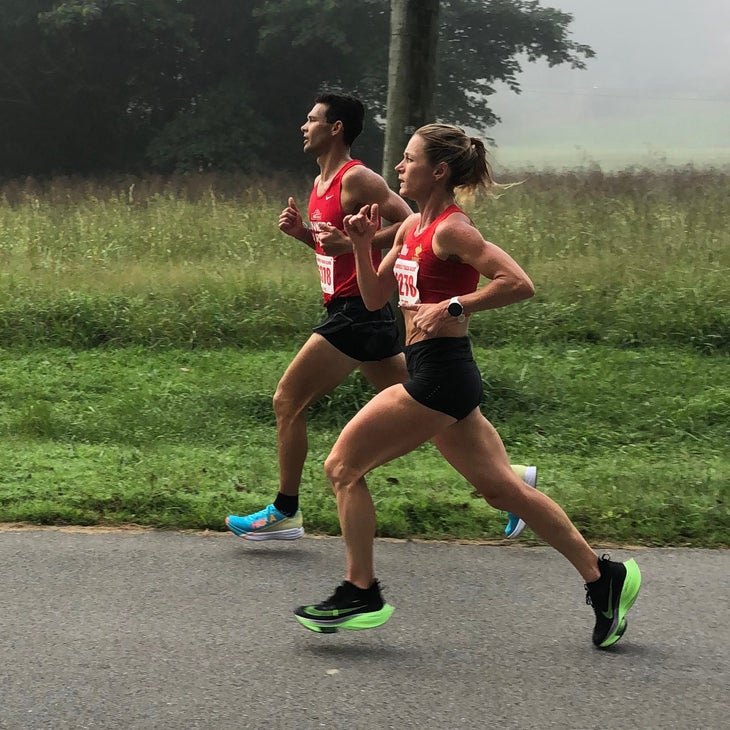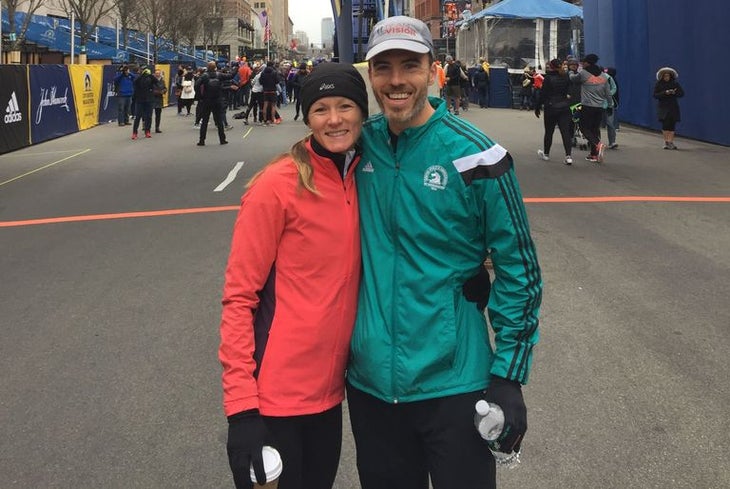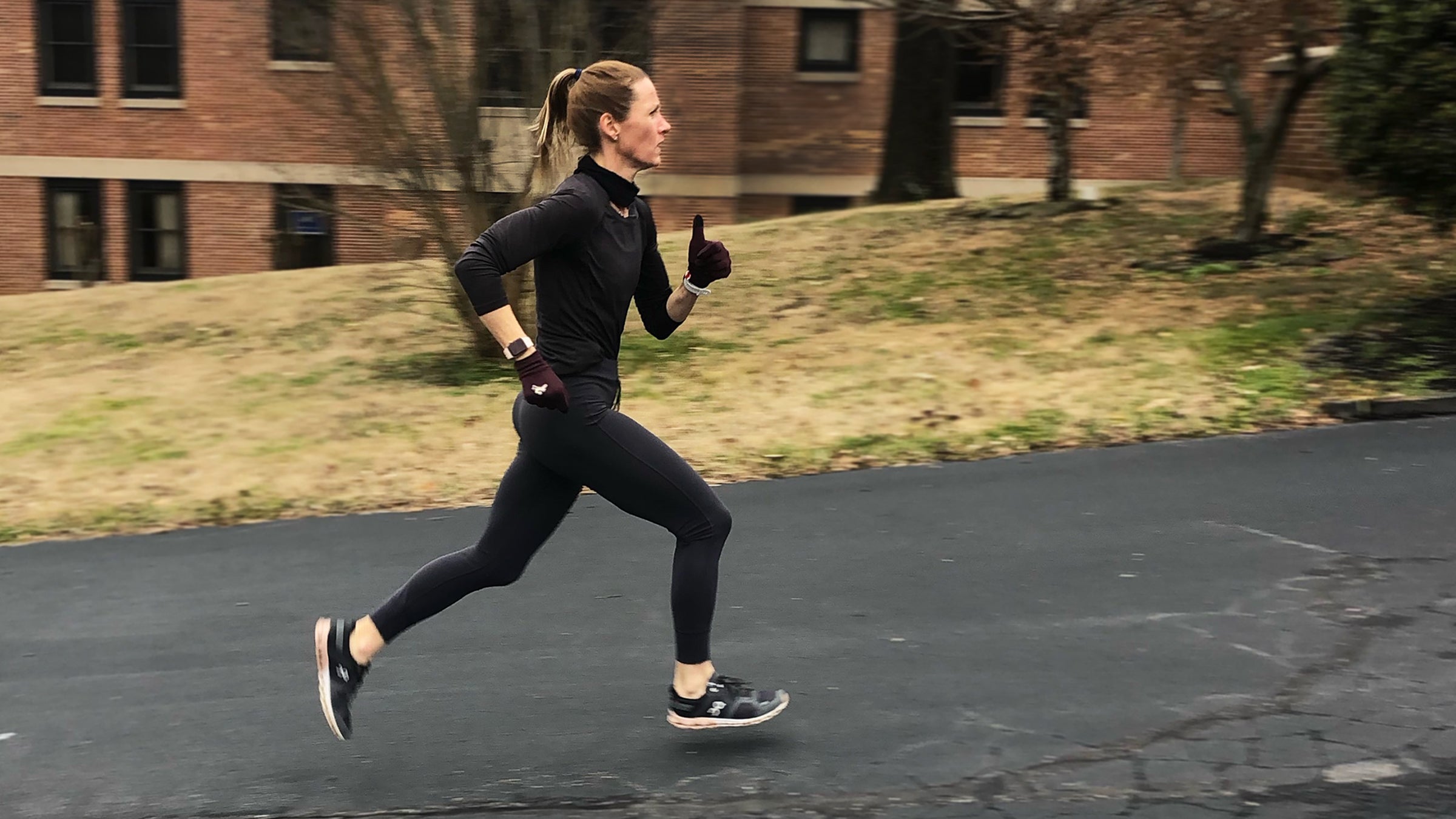Gina Rouse is looking for redemption at Boston, a race that was unbearably hot when she ran it in 2017, and, when she returned in 2018, left her in the hospital with hypothermia. At 42, she’s not only looking for a top masters finish but aiming to be the best she’s ever been.
“I’m planning on PRing at Boston,” says Rouse , whose current marathon PR is 2:38:41, run at the hilly Atlanta Olympic Marathon Trials in 2020. “I’m thinking, the third time’s a charm.”
Reviving a Dream
After running in high school and collegiately, Rouse took a big break from running until she ran her first marathon at 31, shortly after giving birth to her first daughter.
“I would nurse the baby and then go out the door and that was time for me,” says Rouse. “It was my time on the road. It was quiet. It was something for me to chase after that was non-mom time.”
However, it didn’t take long for her husband’s coach, Bobby Holcombe, to notice her talent. After Rouse had their second daughter, Holcombe told her that he thought she could make it to the Olympic trials. When Rouse heard this, her 12-year-old self lit up.
“In 7th grade, I said, ‘I’m going to go to the Olympics,’” says Rouse. “Going to the trials was like going to the Olympics.”
After talking to Rouse for just an hour, it’s clear that she’s an energizer bunny with the discipline of, well, a runner. Not only is she now a seasoned runner with 11 years of running under her belt and three daughters, ages 10, 8, and 6, she’s a temporarily paused nurse practitioner (“I’m not done with nursing, I’ll be back,” she says), a salesperson for Rodan Fields skincare, and very involved at her church. To make it all work, she credits getting enough sleep, proper nutrition, and masterful planning.

Rigid Scheduling, Flexible Reality
“I run a very tight ship, but it’s the only way to get everything done and have time for some rest and recovery,” says Rouse, who logs 90 to 110 miles each week. “My kids are going to grow up and call me the drill sergeant.”
On a typical day, Rouse is up at 4:00 a.m., preparing school lunches and responding to emails (she’s a coach for Knoxville Endurance) before heading out the door for a run after her husband, Matt Rouse, who is also training for Boston, gets back from his (yes, he was out the door at 4:00 a.m.). When she gets home, she throws a bunch of chicken breasts in the Crockpot and adds sweet potatoes in the evening for an easy dinner. After her afternoon workout, Rouse has food and drinks waiting for her in the car. As soon as her kids walk in the door from school, their track uniforms go straight into the washing machine.
“It’s a delicate balance of being rigid but flexible enough to stray from the perfection of the schedule,” Rouse says.
And although Rouse seems superhuman, she is quick to acknowledge the community around her that makes everything possible. Her husband, daughters, parents, physical therapist, and coach all help her get to the finish line of each race. What once was about some solo, non-mom time is now about so much more than just herself.
“Now that my daughters are older and they see me competing and racing, it’s so much more than just me,” says Rouse. “It’s our family. It’s our community. All of us are in this together; it’s never just the athlete.”
Sometimes they help her reign things in a bit because, otherwise, she’d constantly be going at 110 percent. Her coach is especially crucial for making sure she doesn’t overexert herself.
No two training weeks are the same, but Rouse can depend on seeing easy recovery days, long runs, long repeats, and tempo runs incorporated into each week. Here’s what a week often looks like for Rouse:
Typical Training Week
Monday: Easy recovery day
Rouse often meets running friends at a local coffee shop to run 8-12 miles at a conversational pace. In the afternoon, she might do another short run, depending on how she feels.
“I train with other people 80 percent of the time,” says Rouse. “I like a good solo run to clear my head, but I spend a lot of time running with others.”
Tuesday: Long repeats
Tuesday is Rouse’s big workout day. Depending on her training volume, she’ll do 6-10 long repeats, whether that’s 800s, 100s, 1200s, or mile repeats.
On a recent Tuesday, she did 6 x 1-mile repeats starting at 5:50 pace and cutting down five to seven seconds per mile with one mile at 7:20 pace between each effort. (Roughly half marathon pace down to 5K pace)
“The idea is you’re blending speed and endurance, so you’re training your body to be able to carry that speed over the distance,” says Rouse.
In the evening, Rouse might do a short shakeout run depending on how she feels.
Wednesday: Long run
Rouse’s legs are usually toasted from her Tuesday workout, so she’ll log an easy long run (typically between 15-25 miles) the day after a hard workout, her pace dictated by how she feels.
Thursday: Repetition day
Thursdays are often hill repeats, ranging from 100m to 400m long. A common repetition workout for Rouse is 12 x 400-meter hill repeats at marathon pace with rest coming from jogging down the hill. These hill repeats, which are fairly long, train Rouse’s body to endure a hard effort, recover, and then return to marathon race pace.
“They’re are just a beast,” says Rouse, referring to the 400-meter variety. “For this training cycle, it was the dead of summer, so I was sweating bullets, and you just want to get up this dang hill, which is kind of how you feel at Boston.”
Friday: Easy recovery day
After another hard workout, Rouse returns to a shorter, recovery run (usually between 10-12 miles), giving her body a chance to recover.
Saturday: Long run progression
Rouse likes to get in a couple of runs that are nearing the marathon distance, so she’ll run 24-26 miles on her Saturday long run. Her bread-and-butter workout is to run the first 10 miles at an easy, conversational pace and the next 10 miles at or near her goal race pace. Ideally, Rouse does this run on a terrain that mimics the actual racecourse.
“I live in the Smoky Mountains, which is great because I can stimulate Boston really well,” says Rouse. “A group of us will head out there and simulate running downhill, and then we’ll have several flat miles before hitting another hilly section, which is very similar to the Newton Hills at Boston. We’ll set up water tables and bring nutrition to practice our race day nutrition. We want to mimic Boston as much as we possibly can.”
Sunday: Easy miles
Rouse and her husband usually run 12 miles easy on Sunday with their kids scootering or running alongside them.

Actual Training Week
Few weeks, however, follow the typical pattern exactly. Actual weeks have to wrap around life schedules and recovery realities. Here’s what the week of September 20th actually looked like for her, three weeks out from Boston.
| Gina Rouse’s Training September 19–25. Last Hard Week Before Boston. | |
|---|---|
| Sunday | 10 miles easy, finishing with 6 x150m strides |
| Monday | Last Long Run: 24 miles
0-10: Easy 10-12 Progress down to marathon pace (6:00–6:20/mile) 12-20: Marathon pace 20-22: Slightly faster than marathon pace 22-24: Cool down |
| Tuesday | A.M. 4 miles easy
P.M: 7 miles easy, Strength training |
| Wednesday | A.M. 4 miles easy
P.M: 10 miles easy, PT session |
| Thursday | • 3 mile warm up
• 16 x 200m with 200m recovery jog. Started at 42 seconds/200m, worked down to 27 seconds/200m • 4 mile cool down Total mileage: 11 |
| Friday | 13 miles easy |
| Saturday | • 3 mile warm up
• 6 x 1-mile repeats with 1-mile recovery jog. Splits: 5:49 / 5:46 / 5:39 / 5:31 / 5:24 / 5:20 • Recovery miles: 6:45-7:30/mile Total mileage: 16 |
| Week Total | 99 Miles |
Rouse credits consistency for her high-volume weeks, injury prevention, and success. Over the years, she has slowly and steadily gone from 50-mile weeks to now sometimes as high as 110 miles. Any time she tried to bump up too quickly, she either became sick or injured, a clear sign that her system wasn’t benefitting from the steep increase in mileage. Instead, she’s able to maintain her higher mileage when she adds volume consistently but slowly.
“No matter what a runner is doing, if you’re getting out there running, staying consistent, I think that’s where you’ll find longevity in the sport and see the most success,” says Rouse.
As Boston quickly approaches, Rouse is feeling like her consistent training is going to pay off. She suspects she’ll run in the low to mid 2:30s, which if she accomplishes, will indeed reward her with a PR — and very likely a top Master’s finish. Does that motivate her? Absolutely. After all, her personal motto is, Always Chasing for the Top.
“I love Boston, I love this city,” says Rouse. “It’s all so magical, and I’d really love to have a magical performance.”


